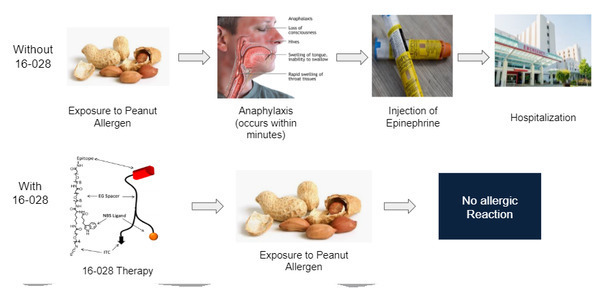Allergy Inhibitors
Tech ID: 16-028
Inventors: Dr. Basar Bilgicier & Dr. Tanyel Kiziltepe
Date added: October 14, 2020
Overview
A novel targeted preventative therapy for allergic reactions.
Technology Summary
320 million people worldwide are affected by food allergies and up to 54.6% of people experience reactions to one or more allergens. The allergic reaction (type I hypersensitivity) is a complex immune reaction to innocuous compounds such as food, environmental factors, and drugs. The characteristic cellular process of type I hypersensitivity is the release of inflammatory cytokines such as histamine from mast cells and basophils after exposure to an allergen, also known as a degranulation response. The degranulation response can cause symptoms from harmless skin irritation to a life-threatening anaphylaxis reaction, resulting in more than 300,000 ER visits per year in the US. Unfortunately, there is no effective proactive therapeutic for allergic reactions. The current standard of care is the Epipen, which reverses the effects of an allergic reaction, must be kept on hand at all times, and must be replaced regularly due to its shelf life.

Researchers at the University of Notre Dame have recently developed a novel proactive therapeutic to prevent allergic reactions. It is a pill that is taken monthly that effectively eliminates the allergy from the patient as long as the medicine is taken continuously. The therapeutic compound prevents the degranulation responses characteristic to allergic reactions by permanently blocking specific antigen binding sites. The novel allergy inhibitor molecule can be synthesized by commonly used peptide synthesis techniques and modified to inhibit allergic reactions to any compound.
Market Advantages
• Non-invasive pill, unlike other injectable treatments
• Prevents severe allergic reactions – patients would avoid the hospitalization that follows Epipen administration
• Would not have to be regularly replaced, unlike Epipens that have short shelf-lives
Market Opportunity
• $5.7B Allergy Market (ie. Peanuts, shellfish)
Publications
Oriented Immobilization of Fab Fragments by Site-Specific Biotinylation at the Conserved Nucleotide Binding Site for Enhanced Antigen Detection. doi: 10.1021/acs.langmuir.5b01734
Oriented antibody immobilization by site-specific UV photocrosslinking of biotin at the conserved nucleotide binding site for enhanced antigen detection. doi: 10.1016/j.bios.2013.05.052.
Intellectual Property
PCT/US2016/067588
Technology Readiness Status
TRL 3 – Experimental Proof of Concept
Contact
Richard Cox
rcox4@nd.edu
574.631.5158